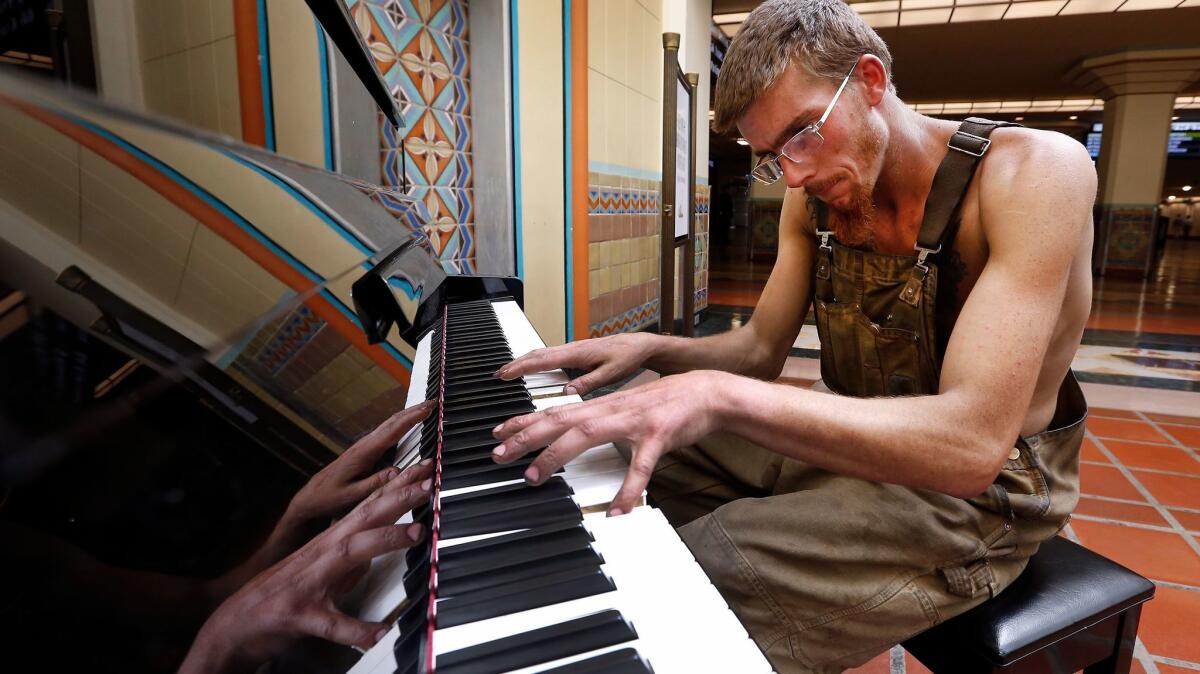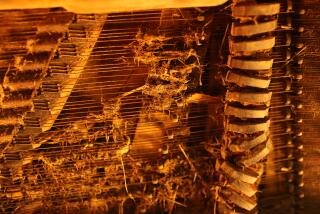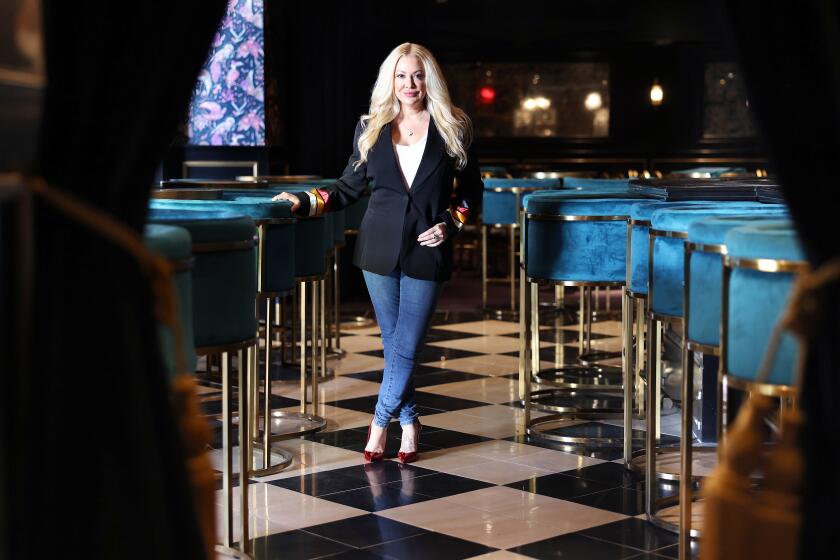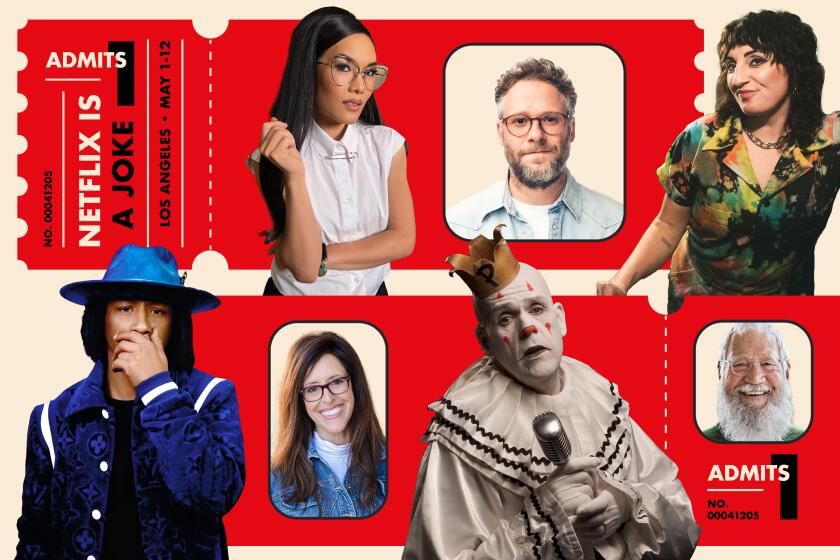For this homeless man, playing Union Station’s free piano brings respect and an appreciative crowd

On most mornings, a young homeless man, Matthew Shaver, can be found playing the free piano at Union Station — to the delight of morning commuters. (Al Seib / Los Angeles Times)
On most mornings, Matthew Shaver casually emerges from the packs of speed-walking commuters scuttling across Union Station and quietly takes a seat at the public piano at the heart of one of Los Angeles’ busiest transportation hubs.
For 20 straight minutes — the maximum play time, according to the posted rules — Shaver takes over the keys, filling the atrium with buoyant improvisations of jazz, pop and blues.
His playing often attracts a small crowd. Tourists film him. Regulars drop spare change and bills. He’s such a fixture that if the security guards are otherwise occupied (or feeling generous), he might get to play longer than the time limit.
On a recent Monday morning, a man jumps out of the crowd and joins the pianist for an impromptu duet. When the number is over, the crowd applauds and cheers. A woman in a wheelchair wanders over, tucks a bill into his hand and says, “Bless you, child.”
“Thank you,” Shaver says quietly. “Thank you so much.”
Despite these well-received appearances at Union Station, the pianist often draws a double take.
Shaver, 30, is homeless — or as he likes to describe it: “home-free.”
Tall and slender with chiseled features, Shaver dons a uniform that consists of a pair of ragged Carhartt overalls worn without a shirt. His chest is emblazoned with a pair of tattoos: one an elaborate fish resembling a Japanese block print; the other an image of a pirate and the words “life” and “death.”
“I love pirates,” he says with a smile.
You pray about something and then you meditate on it. The piano is my meditation.
— Matthew Shaver

Shaver has played piano since he was 4 — introduced to the instrument by two older sisters who taught him the basics. He was soon studying classical music with private instructors, but says he really came to love piano when he learned about jazz and blues.
The piano, he says, “is the most positive influence in my life.”
It is through the piano, he says, that “I felt accepted, I felt wanted, I felt that I was useful, that I could do something that could last.”
Shaver lives on the streets outside of Union Station and materializes most mornings to play — for money, but also fulfillment.
“It’s a meditation,” he says. “Like, you pray about something and then you meditate on it. The piano is my meditation.”
Shaver is from the Seattle area. He says he grew up in foster care, that he is a veteran of the U.S. Marine Corps, that he was injured in Afghanistan about half a dozen years ago and that he has done stints in jail. In conversation, his thoughts frequently meander — and the details of his life are often described cagily and hazily, making many of them impossible to verify.
But a rap sheet that matches his name and his circumstances in Washington state shows a guilty plea for drug possession, among other things, and numerous appearances at a Veterans Treatment Court.
“Depression has always been a thing,” Shaver says over breakfast at a Denny’s across the street from Union Station.
“I like to get baked,” he adds. “I like to get high occasionally.” Though he says that in recent years he’s cut back on drinking, which has a tendency to bring out his aggression.
Halfway through our conversation, he points at the ceiling so that we might observe that Chubby Checker is playing on the restaurant’s speaker system. Shaver is a big fan of Motown.
Whatever the details of his biography, it is Shaver’s piano playing that makes him such a striking figure.

Doing drugs doesn’t make a person bad. Just like going to church doesn’t make you a good person. [But at the piano], I have respect.
— Matthew Shaver, pianist
A circle of people nearly always surrounds him, respectfully listening whenever he’s at the keys. It’s hard to think of many situations in which someone who lives on the streets is treated with such deference by complete strangers.
Jay Taj operates a small recording studio in Santa Ana and is host and content creator for All Def Music, a digital hip-hop network founded by Russell Simmons. He is a regular commuter through Union Station.
“The first time I heard him, I didn’t even know there was this piano,” Taj says. “Then I thought it was like a thing where they have an entertainer play. And then I saw him playing and he was wearing these worn-down overalls.
“As a piano player myself, it was magnificent. I watched him jump from ragtime to classical to bluesy stuff.”
It was Taj, in fact, who was seen jumping in for an impromptu duet with Shaver on a morning in late September.
He says he has a great deal of sympathy for the musician’s situation.
“I got into some trouble myself and I too was dealing with some emotional issues,” he says. “Drugs can take away a lot of who you are, so it’s magnificent that someone can keep up with that talent — and to do it in a way that is so witty.”
Ken Pratt, who helps oversee operations at Union Station, says the piano has been a hive of activity since it was installed last year — drawing expert players and amateur tinklers alike, all of whom are allowed their allotted time of 20 minutes.
“I can’t tell you,” he says, “how many renditions of ‘Chopsticks’ I’ve heard.”
He is familiar with Shaver’s playing and knows him by name. He says the piano is serving its purpose of connecting people — to each other and to a young man they might otherwise ignore.
“[People aren’t] going to look at him just for his appearance,” says Pratt. “They will look at him for his talents and his humanity. And his problems too. So maybe they will give him a little bit of slack.”
He also notes that the outreach team at the station has offered Shaver access to services. But so far, Pratt says, Shaver has declined.
Shaver, in the meantime, appreciates the presence of a piano that he can play — no questions asked.
“Sometimes,” he says, “I’ll go into a church and say, ‘Hey, can I play for two or three minutes?’” Sometimes he is accepted. But on many occasions he is refused.
Rejection is something he frequently contends with.
“I’ve been called disgusting by guys in suits,” he says matter-of-factly. “Doing drugs doesn’t make a person bad. Just like going to church doesn’t make you a good person.”
But at the piano, that all falls away. “I have respect,” he says.
Shaver says he used to use his piano-playing skills as a way of charming the ladies. Now he sees that as “a misuse of the gift that God gave me.”
“It’s the only thing I got left,” he says. “It’s the only thing I got left.”
ALSO
With raw eggs and a roomful of clay, Anna Maria Maiolino makes unsentimental art about being a woman
With Trump’s DACA reversal, an art moment rises: how two works have acquired new significance
Did you spot the egg-shaped museum named NuMu cruising L.A.? It’s now resting at LACMA
More to Read
The biggest entertainment stories
Get our big stories about Hollywood, film, television, music, arts, culture and more right in your inbox as soon as they publish.
You may occasionally receive promotional content from the Los Angeles Times.







